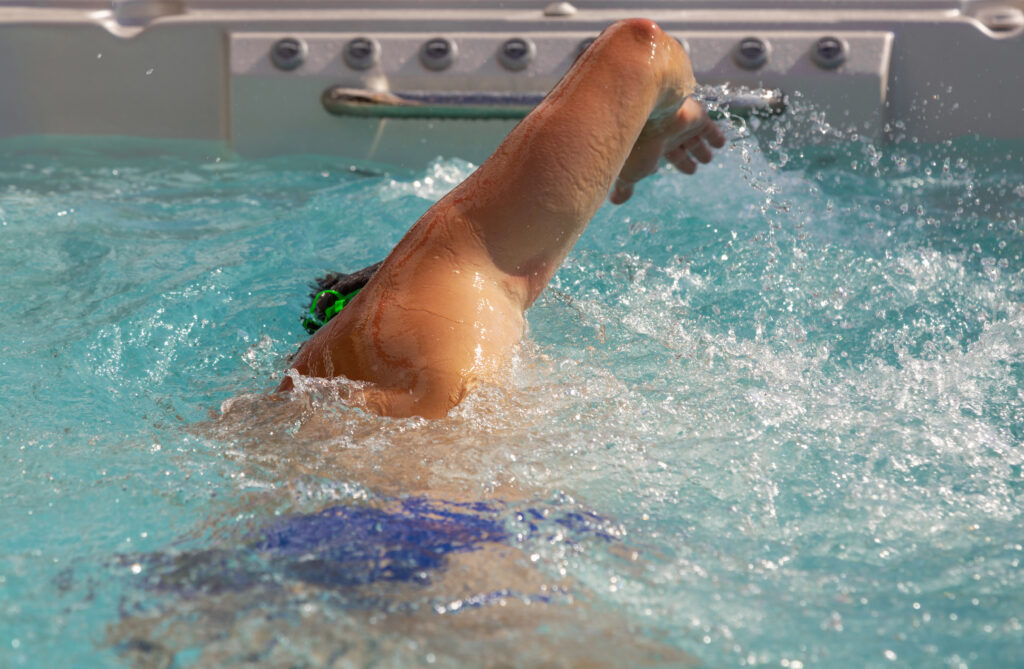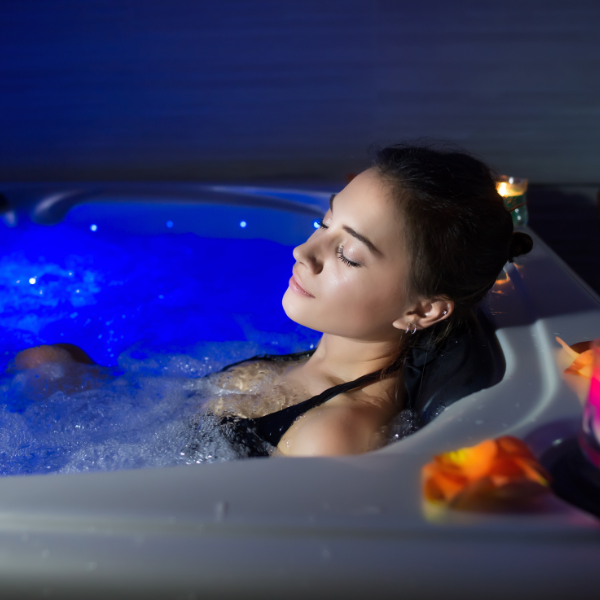Whole-Body Benefits of a Hot Tub/Swim Spa
Whether you want to cool off in the sweltering heat or warm up in frigid temperatures, hot tubs and swim spas will do just that while giving you instant fun and relaxation right from home—but that’s not the only benefit they offer. In fact, spas and tubs will not only make you feel good, but they’ll also improve your mental and physical health while doing so.
WASH AWAY STRESS
One of the most significant benefits of a swim spa or hot tub that is most often the motivation of shoppers is stress reduction. After all, there’s nothing that compares to the relaxation owners feel when slipping into the warm water after a long day. In fact, this practice has been used for decades, if not centuries. “While showering is common worldwide, the Japanese have long used whole-body, hot water immersion (bathing) for both its therapeutic and beautifying effects,” according to the study Physical and Mental Effects of Bathing: A Randomized Intervention Study by Hayasaka S., Kurihara S., and Nakamura, Y.
Immersion bathing is most often referenced to as an alternative to sponge bathing for newborns, but it can also be beneficial for adults: “While showering is common worldwide, the Japanese have long used whole-body, hot water immersion (bathing) for both its therapeutic and beautifying effects,” the study claims.
For this exercise, researchers evaluated 38 participants who underwent a “2-week intervention of immersion bathing in warm water (40°C) for 10 min (bathing intervention) followed by 2-week shower bathing without immersion (showering intervention) or vice versa,” as stated in the study’s abstract. Upon analyzing their results, researchers found that the “Profile of Mood State scores were lower for stress, tension-anxiety, anger-hostility, and depression-dejection.”
The New York Post reaffirms these findings, citing from research gathered from a study performed at Conventry University in the UK. In this study, researchers evaluated participants between age 26-60 after three half-hour sessions in a hot tub over three days. Once the sessions concluded, the research team studied a slew of participants’ physical attributes like mood, heart rate, blood pressure, blood flow, cortisol, thermal perception and anxiety—and the results prove just how valuable a good soak in a hot tub or swim spa can be to your mental health. “In addition to lowering blood pressure, the tub time reduced cortisol, the hormone that helps the body manage stress, by 22%,” the Post writes. Coventry researchers helped to confirm this in their study, reporting that 10% of participants felt reduced stress after their tub sessions overall.
BODY BENEFITS
While reducing stress is an incredible mental benefit of hot tubs and swim spas, there are additional perks that can improve your entire body, not just your mind. “Immersion bathing, but not shower bathing, exerts hypothermic action that induces increased blood flow and metabolic waste elimination, which may afford physical refreshment,” as stated in Physical and Mental Effects of Bathing.

While your blood flow will increase as you soak in your tub/spa, your blood pressure will do the opposite. “The high temperatures in a warm tub or sauna cause your blood vessels to dilate, which lowers blood pressure,” states Harvard Medical School professor Dr. Adolph Hutter. “The volume of blood your heart pumps will also rise, especially in a hot tub.”
In addition to heat, swim spas can also lower blood pressure by acting as an exercise outlet you can enjoy from your very own home. With jets that offer customizable resistance, swim spas allow you work out your arms, abdomen, and other targeted muscle groups.
But if you’ve had a long day and aren’t looking to do anything strenuous, a swim spa, as well as a hot tub, can still be your perfect solution to decompress. Hydrotherapy, or aquatic therapy, is a practice used around the world to relieve symptoms like pain, stiffness, swelling, bruising, and menstrual aches.
Hydrotherapy is especially beneficial for users suffering from arthritis. Bullfrog Spas lists three features of a hot tub/swim spa that help provide relief from arthritic pain through hydrotherapy: warmth, massage, and buoyancy.
As referenced earlier, warm water helps dilate your blood vessels and increase the flow of nutrients to your body, ultimately relaxing your muscles and relieving stiffness. This, combined with a massage from your tub/spa’s jets, can provide alleviation from arthritic aches. “Any type of full-body massage therapy that involves moderate pressure…should help relieve arthritis pain and ease tension,” says Tiffany Field, PHD, a research psychologist at the University of Miami Medical School. Furthermore, you won’t need to worry about exacerbating any existing pains or creating new ones by trying to hold yourself above water. The natural buoyancy and current in hot tubs and spas provide an upward force on your body so your joints and muscles don’t need to put in the extra work.
POST-SOAK SLUMBER
While the features of a hot tub or swim spa are valuable at any time, a key benefit to a massage and a warm soak is improved sleep. In the early evening, internal body temperature starts to decrease while skin temperature starts to increase—but soaking in hot water can help regulate both of these temperatures. “Scientists hypothesize that immersing the body in warm water aids this natural temperature regulation process, improving sleep as a result.
Researchers have dubbed this phenomenon the “warm bath effect,” according to the Sleep Foundation. This effect has been backed up by numerous studies focused on the effects of immersion bathing before bed. In a meta-analysis of 17 studies, researchers found that submerging yourself in a body of water between 104-108.5 degrees Fahrenheit undoubtedly “improves sleep quality,” the Sleep Foundation explains. “Those who bathe or shower between one to two hours before bedtime also fall asleep faster.”
Compared to a general bath, hot tubs and swim spas maximize your bedtime benefits with the additional holistic benefits each offer. So when you spend your evenings enjoying a nice soak, you’ll have no trouble slipping into a deep sleep that’ll leave you feeling refreshed the next morning.
Whether you use your hot tub or swim spa as a relaxing oasis or an exercise area, the mental and physical benefits they provide make the investment a no-brainer. Pinpoint your motivations for purchasing a tub or spa and start improving your overall wellbeing today!


